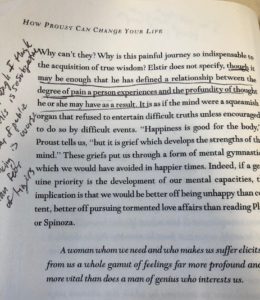Business & Money
The markets have been choppy and difficult now for a couple months. I wish I could tell you where we go from here, but I (and anyone else – despite what they might have you believe) have no idea.
That said, one of the things I look to do during choppy times is to put things into historical perspective. This article from Ben Carlson does an excellent job of that.
So roughly 60% of the time a 10% correction didn’t lead to a bear market while roughly 40% of the time it did.
I don’t love those odds, but it’s important to be aware of them nonetheless.
Plus, call me masochistic, but I rather like times like these. They test your confidence and your mental fortitude. No amount of reading about corrections and difficult times will teach you as much as the actual difficult times teach you. I find that you have to cut your teeth and develop some scar tissue if you really want to stand a chance in the markets.
Human Progress
You know how they say that history never repeats itself, but it rhymes?
Well someone drop a beat because Run His-Tor-E is about to spit that fire! (see what I did there? 😎)
Do you remember, about 15 or 20 years ago, when globalization was all the rage?
It was this unstoppable force taking the world by storm.
There would be winners and losers, but there would be more winners so the losers would just have to deal.
There would be ideological casualties along the way (nationalistic pride, cultural homogeneity, industries specific to a particular region), but there was no sense fretting the inevitable.
Finally, it would be very difficult and complex to enact and deploy, but the bankers and financiers of the world had everything under control.
And we all know where that story landed? The global financial crisis.
To be clear, it would be a vast oversimplification to try and draw a cause and effect relationship between globalization and the GFC, but I imagine there might be some connection. Global markets and interconnected credit systems means that local credit crunches become global ones.
If you put your ear close to the wall, DJ His-Tor-E seems to be revving up for a second verse.
Think about the narrative around the technological revolution that we currently find ourselves in.
Technology is an unstoppable force.
There will be winners and losers, but ultimately more winners so just deal.
Many jobs may disappear, privacy as a concept might cease to exist, truth itself may come under fire, but these are cultural artifacts that must be sacrificed on the way to a techno-utopia.
And it’s super complicated, but don’t worry because the jean wearing Patagonia vest wearing tech bros in Silicon Valley will all drop out of their ivy league schools to save us.
Those 2 stories sound eerily similar. And during times of polarization, nationalism, and populism, the last thing we need is for people to think that technology is coming for them. So it seems to me that we may need a different narrative around technology and we also need to think more seriously about what is it that we’re trying to accomplish through technological change.
Philosophy
Whenever I get sick, I usually only show symptoms for a few days at most before bouncing back. My immune system seems fairly resilient.
My wife, on the other hand, generally gets sick for at least a week or two. And often times, it seems, from the same bug that slowed me down for a matter of days.
It’s clear that our immune systems are vastly different. (it might have something to do with the fact that she regularly bathes in hand sanitizer throughout the day)
Similarly, people are very different from one another psychologically and emotionally. What pisses one person of or gives them extreme anxiety, doesn’t matter at all to the next person.
What’s fascinating to me is that the circumstances under which we live have changed drastically over the last few thousand years. Our brains meanwhile look basically the same. So the fear of imminent danger that may have arisen from severe hunger, threats from carnivorous animals, or drought, have now been displaced by fears of public speaking, feelings of inadequacy on social media, and insecurities around body image. In other words, while physical safety may not be a regular issue for many reading this blog, psychological safety is constantly under attack. And often it seem that the physiological responses to threats of the opposite type are basically the same. Those in the medical field describe this phenomena as psychosomatic.
I point all of this out because I’m reading a book where I happened across the following section:

While I agree that more profound suffering might lead to more profound thought, the element of subjectivity makes this more complicated than a simple statement of fact. The profundity measuring stick is a purely subjective one. Of course, experiencing something like the holocaust or the murder of your family in front of your eyes would rank as more severe than a fear of public speaking, but it’s impossible to really compare the experience of suffering between two different people.
Perhaps I might come to something closure to a conclusion on this topic as I read on. (the book is called How Proust Can Change Your Life btw)
My Latest Discovery
It turns out oysters are rather delicious. Over the last few weeks I’ve enjoyed a seafood paella that had oysters and also enjoyed a fried oyster appetizer.
I’m still no fan of slurping them from the shells though. But I think that has more to do with the slimy texture and appearance than the actual taste. I’m not sure why, but I have some deep seeded psychological aversion to slimy things.